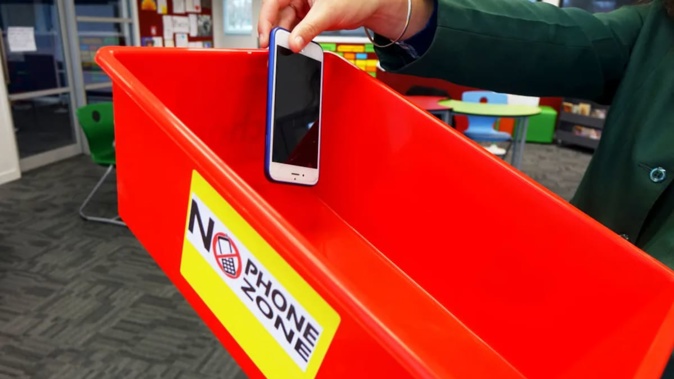
By Danielle Clent of RNZ
The second school term began on April 29 - and so did the Government’s official ban on cellphones in schools.
It was a policy National promised to deliver during the election if it was elected into government.
Prime Minister Christopher Luxon celebrated the day, posting “Happy No Phones in School Day” to social media.
“From today, it’s official,” Luxon wrote. “Phones have been banned in schools across the country. It’s time we cut the distractions so kids can learn and achieve.”
But what does the cellphone ban mean for students and what happens if they are caught with their phone? What if there is an emergency and a parent needs to reach their child?
Why have cellphones been banned in schools?
The National Party said banning cellphone use at school would help lift achievement and support students to make the most of their education.
“To turn around falling achievement, students need to focus on their schoolwork during their precious classroom time. That means doing what we can to eliminate unnecessary disturbances and distractions.
“We want teachers to be able to get on with teaching and students to concentrate on learning. Student achievement has declined over the past three decades, jeopardising kids’ future livelihoods and threatening New Zealand’s future prosperity.”
The National Party said Aotearoa once ranked in the top 10 in the OECD for maths, science and reading - but no longer does.
- Kerre Woodham: Phone ban in schools starts today
- Cell phone ban: How did Kiwi students handle their first day?
- Nationwide school phone ban comes into force today. Will smartwatches provide a loophole?
- Back to school: Government's cell phone ban comes into force this term
- Heather du Plessis-Allan: Let's ignore the naysayers as the cellphone ban kicks in
“More than half of Year 8 students are behind expectations in maths, science and writing, according to the National Monitoring Study of Student Achievement.
“Students only have one shot at their school years, and we want to help them make the most of their valuable class time.”

Prime Minister Christopher Luxon (right) and Education Minister Erica Stanford. Photo / Mark Mitchell
Do other countries ban cellphones in schools?
Yes. The National Party says “many” schools - both in New Zealand and overseas - have banned cellphone use, leading to positive outcomes and improving achievement.
According to the New York Times, the US state of Florida passed a law requiring public schools to ban phone use during class time in 2023.
The UK Government had also issued new guidelines recommending cellphone use for students be prohibited in schools.
Italy and China have also made changes, with Italy banning phone use during class and China barring students from taking phones to school altogether.
Luxon said Australia and Canada also had similar bans in place that worked.
“We’ve seen that in Australia where they’ve implemented something similar in all the states... and it’s worked well.”

Prime Minister Christopher Luxon. Photo / Mark Mitchell
So can students use their phones during morning tea and lunch?
No. The ban is of cellphones in school - not just in the classroom.
The National Party said many schools and parents were concerned that phone use was impacting students’ health and social benefits.
They wanted students to reduce their screentime and interact with others during breaks instead.
“That is why our policy will apply throughout the whole school day. The presumption is phones will be off and away all day.”
Education Minister Erica Stanford told media on the first official day of the ban that the policy has been “overwhelmingly successful”.
“Principals have been writing to me every day telling me how wonderful it is to hear the noise in the playground, librarians are telling me kids are taking books out more often, students themselves are telling us that they don’t have the anxiety to check their phones every five minutes,” Stanford said.
“This is overwhelmingly popular.”

Education Minister Erica Stanford during the post-Cabinet press conference in the Beehive. Photo / Mark Mitchell
How will this be policed?
The National-led Government said school leaders would ultimately decide how the ban would work for their particular school.
“Schools will be able to decide exactly how they enforce it, but it could mean requiring students to hand in their phones before school or leave them in their lockers or bags.”
What if there is an emergency and I need to contact my child?
The Government says parents can contact their child through the school office if they need to.
There would also be exceptions for students with health conditions or other special circumstances.
According to the Ministry of Education, schools must allow students to use or access their phones when:
- used for health reasons, such as monitoring insulin levels;
- needed to help a student with a disability or learning support need, such as assisting with impaired communication;
- a teacher needs students to use phones for a specific educational task, such as an assignment;
- when the principal deems there are special circumstances, such as the student is a teen parent.
Schools would also need to decide how they manage student phone use during emergencies, such as evacuations and lockdowns, that may occur during the school day, the ministry said.
What about smart watches?
According to the Ministry of Education, the ban is specifically on cellphones.
“Most schools have existing BYOD [bring your own device] policies around the appropriate use of laptops and tablets. Schools are able to make decisions about the management of wearable devices like smart watches in consultation with their community.”
What if a student is found using their phone?
School leaders will determine themselves what to do if a student is caught using their phone when they should not be, the Ministry of Education said.
“The usual behaviour management approach is likely to be appropriate, rather than introducing specific disciplinary actions for students.”
The ministry said schools that already restricted phone use before the ban was implemented followed their school’s approach to behaviour management and discipline - using restorative practices in some cases.
But the school doesn’t own the phone - is this legal?
The Ministry of Education said: “The regulations for student phones to be off and away all day in schools engages the right to freedom of expression affirmed in section 14 of the New Zealand Bill of Rights Act 1990. However, the Ministry of Education considers that the limit on freedom of expression is reasonable and proportionate in service of the policy objective of improved student engagement and achievement.”

Wellington High School principal Dominic Killalea. Photo / John Gerritsen
What are schools saying about the ban?
In August 2023, Secondary Principals’ Association president and principal of Papatoetoe High School Vaughan Couillault told RNZ the plan was not necessary.
“[There’s] not a whole lot of students walking around at interval and lunchtime, banging into lamp posts and buildings because they’re totally distracted by their cellphones,” Couillault said.
“Actually what’s best is to empower schools to make decisions that are right for them and their community.
“I don’t think central [government] controlling banning is the way forward.”
Wellington High School principal Dominic Killalea said the school already expected students to keep phones away during lessons.
“I’ve had a number of teachers come to me and talk about the particular applications that they use with mobile technology,” Killalea said, such as students using their phones to photograph plants on the school grounds for a biology lesson.
“The policy isn’t saying that you can’t do that. However it is just a little more difficult when that teacher says ‘okay, you all have to bring your phones in tomorrow’,” he said.
Wairarapa College principal Matt White told RNZ his school imposed a ban on cellphones at the start of the year and the response from staff and the community had been overwhelmingly positive.
The school had been experiencing problems with students’ phone usage prior to that which he had first-hand experience of when he was teaching a class last year, White said.
“Just the constant checking of their phone, checking it for messages, going on social media, messaging groups, that it was almost a habit that every opportunity a student could have they were checking their phones and that was widespread from Year 9 to Year 13.”
The school’s policy meant that phones could not be used or seen during the school day and that included both break time and class time, he said.

Wellington East Girls College student Semhar Girmay and principal Gael Ashworth. Photo / John Gerritsen
What do students think of the ban?
RNZ spoke to some high school students earlier this year about the ban - with many schools implementing it as the school year began.
Wellington teenager Nina told RNZ the phone ban did not go down well when her school announced students must keep their phones switched off and in their bags all day.
“I think most people were pretty disappointed when they announced in assembly, you could just feel the energy going,” she said.
“Kids are going to start using their computers as they would their phones. You can access a lot of Snapchat, everything... I think it’s a bit pointless.”
Wellington East Girls College student Semhar Girmay was more positive about her school’s policy, which also required students to store their turned-off phones in their bags.
“When we first got the email I ran to my parents and was like ‘what am I going to do, I can’t do this’,” she said.
However, she said she was already paying more attention to school notices and concentrating better in lessons without her phone distracting her.
“I’m not fully used to it, I still catch myself walking into school with it in my pocket, but I think with time, it’s actually fine.”
Fellow Wellington East student Seralina Seumanufagai said she initially thought the ban was a bit extreme and she found the first few days difficult.
“Usually the first thing I do when I get to school is text my friends ‘where are you, what time are you coming’, so now it’s been kind of hard, we’ve been trying to memorise each other’s timetables, walking around the whole school trying to look for each other. But I think as time goes on and by next term everyone will get used to it and all the upset students will calm down.”
- RNZ
Take your Radio, Podcasts and Music with you









